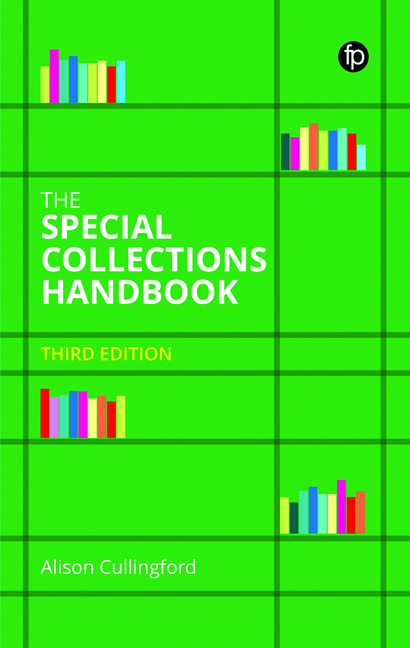Book contents
Appendix B - Skills for your Special Collections Career
Published online by Cambridge University Press: 28 April 2022
Summary
Most professional roles in Special Collections require graduate or postgraduate level skills and experience, although there are growing attempts to diversify the profession via distance learning and more flexible routes to employment. Some specialist roles require doctorates or language skills. Routes and qualification requirements vary by sector and country, depending on the value placed on scholarly expertise versus professional qualifications (Kilmarx et al., 2020).
Our sector is unusual in the library profession in that rapid technological change has not made traditional skills irrelevant. New entrants require expertise in established areas of professional practice (cataloguing, collections care, historical bibliography) and emerging areas (digitisation, social media, outreach, augmented reality). Mouren (2012) offers worldwide reflections on the challenges of balancing these skills.
Fortunately, there are ways to define personal skills requirements. Firstly, monitor the jobs market, looking not only at current employment, but the skills required for aspirational roles. Secondly, explore skills frameworks.
Using skills frameworks
Reflecting on practice and strengths and trying to fill gaps or improve weaknesses is part of professional practice, not just when job-seeking, but to ensure skills match the requirements of current (and probably fast-changing) roles.
Skills frameworks developed by professional associations enable:
• individuals to assess and build their skills
• professional chartership and registration requirements to be created
• employers to recruit and improve their workforces
• library educators to develop courses for prospective librarians.
Some reassurance: no-one is expected to be expert in every single skill listed! The key is to identify your existing level and establish which areas need improvement for your current role and career aspirations.
CILIP Professional Knowledge and Skills Base
CILIP's framework is the Professional Knowledge and Skills Base (PKSB), a circular structure listing areas of knowledge and skills for library and information professionals. Ethics and values are at the core, surrounded by generic skills and professional expertise and then wider context. The PKSB was revised and updated in 2021 incorporating feedback from practitioners across the whole sector, including Special Collections, https://www.cilip.org.uk/general/custom.asp?page=PKSB.
There are nine skills and knowledge areas. Special Collections practice draws from all nine; 01 Collections management and development, 05 Information management and 08 Records management and archiving are likely to be particularly relevant.
See the Special Collections handbook website for discussion of the PKSB and Special Collections skills.
- Type
- Chapter
- Information
- The Special Collections Handbook , pp. 365 - 370Publisher: FacetPrint publication year: 2022



